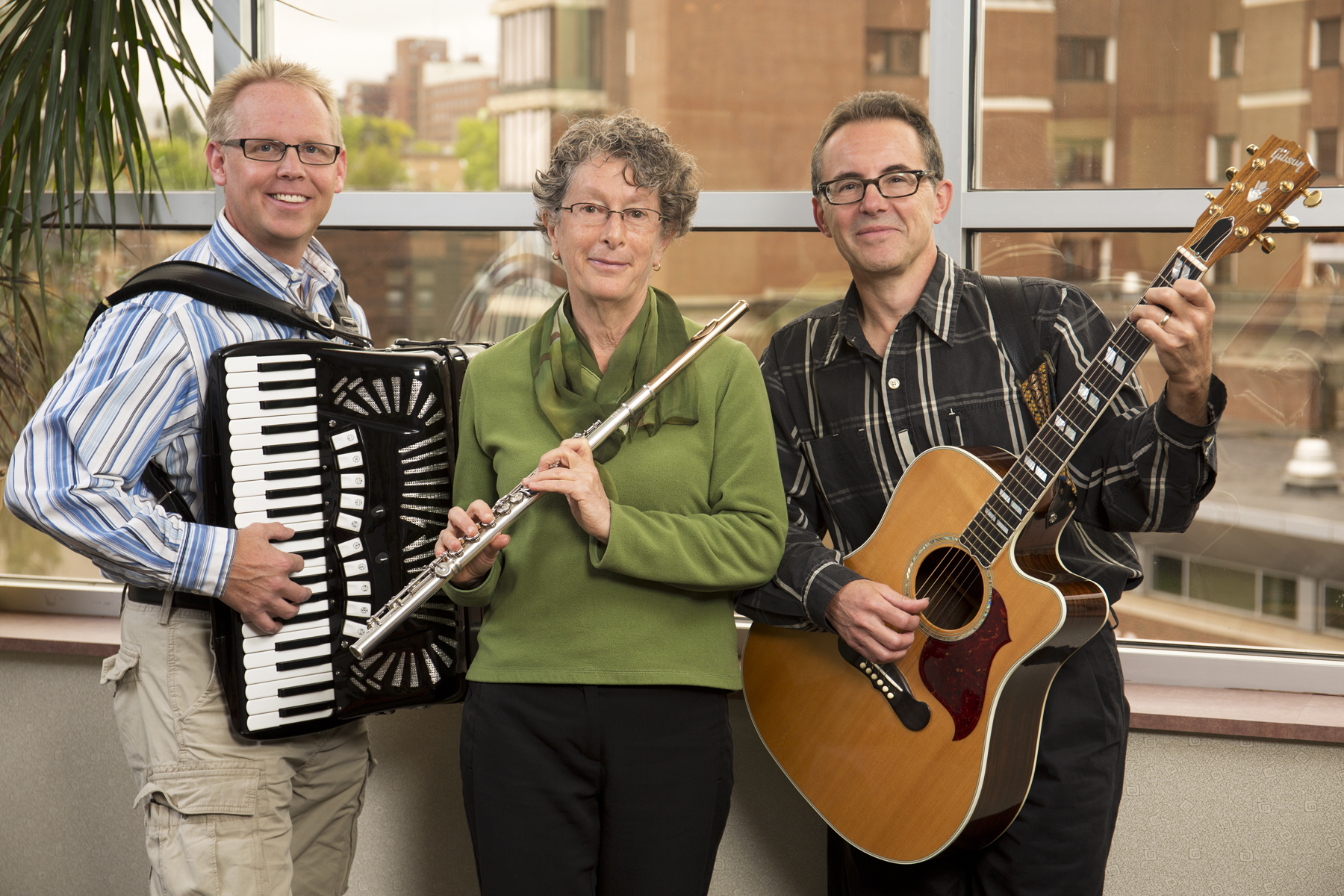It was July and ninety degrees, a scorcher by any standard. But when Greg
Tiburzi arrived with his guitar, the female hospice patient wanted to
sing Christmas carols. Her husband said she always enjoyed holiday songs.
"I'm not a huge fan of Christmas carols," says Greg, but
he obliged and they had a sing-along. "I really got to enjoy it,"
he says. It made such an impression that Greg, a professional musician
and part-time guard at the Tweed Museum of Art, was inspired to write
a song called "Christmas in July."
The Christmas carol story is well-known around St. Luke's Hospice Duluth®,
which provides hospice care in the home or at the hospital for Duluth-area
patients at the end of their life. "Yes, I know that story,"
says Gary Peterson, MD, medical director of St. Luke's Hospice. "The
volunteers who provide music therapy are essential to the function of
our program and the care of our patients. They are so valuable to us."
Marilyn Fifield, the volunteer coordinator for St. Luke's Hospice,
agrees and wishes there were more musician volunteers. "We never
have enough music volunteers. We currently have harp, violin, flute, guitar,
dulcimer and accordion. I would love to have enough people so someone
could play every day of the week in the hospital."
The Clinical Benefits of Music
The benefit of music therapy for patients at the end of life has been well-documented.
"The studies show that music therapy brings a significant reduction
in the perception of pain in hospice patients," says Dr. Peterson.
"Music has also been shown to reduce depression, anxiety, agitation
and improve the overall quality of life."
Another benefit is having a live musician. "The physical presence
of a caring musician brings more benefit than just playing a CD,"
says Dr. Peterson. "There's evidence that this sort of therapy
is as valuable as the medications or other therapies we do." When
playing for patients, Greg has seen for himself the difference it makes.
"You can see how it comforts them, especially the people in pain,"
he says. "You can see it settle them down. I'm finding musical
solutions to help people. I feel blessed to play for them."
"I'm Addicted to It."
Laurie Bastian leads a busy musician's life, teaching viola at the
University of Minnesota Duluth, being a member of the Duluth Superior
Symphony Orchestra as well as playing in both a string quartet and a piano
trio. "I found out about volunteering through the symphony orchestra,"
Laurie says. "I never would have thought of it on my own." With
the encouragement of her daughter, a nurse, she decided to give it a try.
"You can see you are providing a positive experience and it becomes
rather addicting. When you walk in and someone says, 'Here comes my
fiddle player, you make my day,' that makes you feel good."
Laurie plays the violin and many people request fiddle-type music or familiar
songs like "The Tennessee Waltz" or "Over the Rainbow
." She has found that people with dementia like music from their youth.
"People relate to 'Jesus Loves Me' because they know that
song from childhood and they connect with it, even if they can't show
it," she says. One patient was often sleeping when Laurie visited,
and she would play and think the woman wasn't really aware. "But
then, I noticed her foot would start tapping in the bed, and then I knew
I made a connection."
St. Luke's Makes Volunteering Easy
Both Greg and Laurie appreciate the efforts of St. Luke's staff. "Marilyn
and her staff make it so easy to volunteer," says Laurie. Typically,
volunteers spend two to four hours each week. Greg says, "I go once
every two weeks. Sometimes I just see one patient. If it's busy, I'll
see six or seven patients in a day." Laurie appreciates the training.
She says, "The training is very informative, and you learn things
that are applicable to your own life." Greg agrees: "I think,
in a way, this makes me more comfortable with mortality. My mom's
80 and I'm finding it easier to take care of her because of my experience
volunteering for St. Luke's Hospice."
For more information on St. Luke's Hospice
Duluth®
or volunteering, call
218-249-6100.
BELOW: Mark Wiita, Betty Braunstein and Greg Tiburzi share their love for
music with St. Luke’s hospice patients. They are part of a small
group of hospice volunteer musicians.
